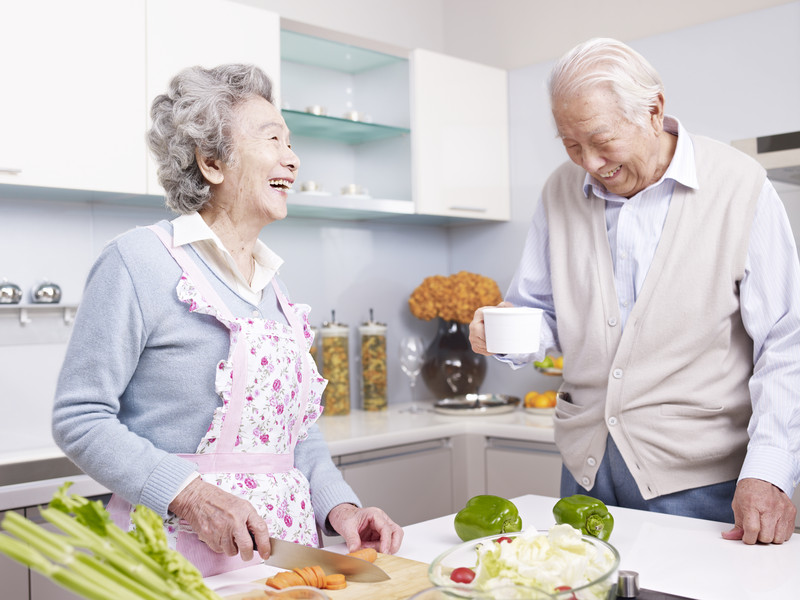The kitchen can be a very dangerous place for anyone, but for those 65 and older, it is even more so. Age-related changes affect the senses and reduce mobility. Cognitive changes, from memory loss to dementia, can add to the danger. With the kitchen as the fulcrum of electrical and/or gas appliances, fire risk is a serious concern: the Federal Emergency Management Agency (FEMA) reports that people over the age of 65 have a 2.5 times greater risk of dying in a kitchen fire than the general population.
Seniors on fixed incomes may feel they cannot afford home improvements. Nonetheless, adaptations and repairs are necessary to enable independent living. Seniors will often need assistance from family members to put safety measures into place. You can help yourself or a loved one by helping to create a safe and usable kitchen and reinforce the precautions necessary to help loved ones prevent accidents and/or respond to a fire. Go through the list below and see if any of the items listed need to be addressed:
LIGHTING:
- Make sure there is sufficient light at the range, sink and counter top areas; consider adding battery operated LED lighting in strips or stick ons;
- Install night lights or motion detecting lights;
- Eliminate shiny work surfaces;
- Install light switches at ALL entrances to the kitchen;
APPLIANCES:
- Eliminate unnecessary appliances; minimize!
- Get in the habit of unplugging counter appliances when not in use and ensure they are away from sink areas;
- Confirm that the range exhaust vent discharges outside the home;
- Gas ranges should have a pilot light and automatic shut-off;
- Make sure controls for the oven are easy to use, clearly marked and located on the front of the oven/range so there is no reaching over burners;
COUNTERS, CABINETS AND WORK AREAS:
- Keep all cabinet doors and drawers closed when not in use;
- Ensure there is plenty of counter space and keep regularly used items there. Clear away all other unnecessary items;
- Install a lever-handled faucet;
- Frequently used items – dishes, seasoning etc. – should be located in cabinets that are most easily reached; consider installing hardware for pull-down shelves for shelves out of reach;
COOKING AND FOOD PREPARATION:
- Keep knives and other sharp objects properly stored; use knives that come with plastic safety sleeves;
- Keep handles on pots and pans turned away from the edge of the range and other burners;
- Keep hot pad and pot holders near the stove;
- Don’t wear clothes that are very loose fitting or have long, loose sleeves;
- NEVER try to relight the pilot light on a gas stove; call for assistance from a friend or family member or gas provider;
- Use large print cookbooks, recipes and measuring tools;
- Use plastic instead of glass where practical to avoid breakage and injury;
- Use a pizza cutter to more easily cut up a variety of foods like pancakes, meats, fruit and casseroles;
- Use a rubber band around the lid of a jar to help open it more easily;
- Find recipes for one pot meals to reduce cleanup; cook once, eat twice using leftovers for next day;
- Replace one-handle pots with pots that have two handles;
- Never leave cooking food unattended; if you need to step away, turn off the stove;
FIRES AND EMERGENCIES:
- Update escape plans with current capabilities in mind and practice them;
- Keep hallways and stairs uncluttered;
- Make sure there are two ways out of each room, including kitchen;
- Place a land line telephone beside the bed, as well as a second set of slippers, house keys, eyeglasses, and a flashlight that stay there all the time;
- Keep a fire extinguisher in the kitchen, but advise seniors to leave the house immediately if the smoke alarm sounds and call “911” from a neighbor’s home;
- Arrange for nearby neighbors to be prepared as an emergency go-to resource;
- Replace wax candles with battery operated LED ones;
- Post emergency numbers on the fridge, including Poison Control (1-800-222-1222);
- Check smoke detectors monthly; Seniors who are deaf or hard of hearing should consider purchasing flashing or vibrating smoke alarms;
MISCELLANEOUS:
- Disconnect the garbage disposal;
- Install non-slip, anti-glare flooring;
- Always wipe up spills quickly and ensure surfaces have been cleaned properly;
- Eliminate any drawers or cabinets used to collect junk;
- Store flammable liquids outside;

